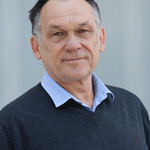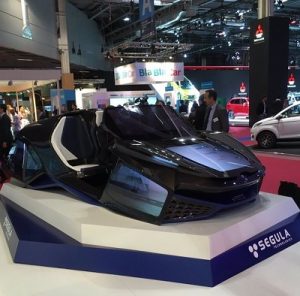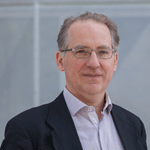
Telecom SudParis and Segula seeking to improve navigation for self-driving cars
On December 12 2024
Article updated on February 12, 2025, to reflect the latest information.
One of the key points in certifying self-driving cars is navigation, and particularly, recognizing the precise position of the road in real time. This topic is currently being explored through a CIFRE thesis (“Industrial Agreements for Training through Research”) at Télécom SudParis, in the CITI Department (Communications, Images and Information Processing), in partnership with the company Segula. The collaboration illustrates the advantages of undertaking theoretical research in connection with applied issues.
The birth of the project
It was a third-year internship at Segula by engineering student Clément Fernandes that provided the opportunity for Telecom SudParis researchers to present the studies being undertaken at the school. Their exchanges revealed the technology consulting firm’s strong interest in the scientific and technical issues raised by advanced driver-assistance systems (ADAS) and navigation for self-driving cars. Such vehicles are fitted with sensors (cameras and LIDAR), allowing for 360° examination of the environment, and graphics processing units (GPUs) handling the collected data. One of the difficulties involves precisely determining the position of the road, particularly when it is covered in snow or rain, or when the surface markings are not visible, for example on a country road.
One of the themes in the CITI research, image segmentation, could contribute to resolving this problem. It involves determining, for every single pixel in an image, what category it belongs to, for example, whether it is black or white, which is not always as easy as it might sound. In the case of self-driving cars, the question is whether a given point is located “on-road” or “off-road”.
Image segmentation therefore represents a promising avenue, to which Telecom SudParis and Segula have agreed to devote shared efforts, in the form of a CIFRE scholarship for Clément Fernandes to complete his thesis at CITI.
An academic-industrial partnership
 Academic research and industrial research (R&D) do not have the exact same objectives. The challenge for Segula’s R&D Department, which is developing a self-driving car prototype, is to improve constant road tracking through algorithms that are more accurate. This requires sophisticated mathematical probability modelling. “In the academic approach, which is our priority, what interests us the most is finding models that are more efficient than those currently in use,” explains Professor Wojciech Pieczynski, director of the CITI Department. The practical application is the extension of our work, in a way. It also allows us to evaluate our results in a real-life situation and help develop the company.”
Academic research and industrial research (R&D) do not have the exact same objectives. The challenge for Segula’s R&D Department, which is developing a self-driving car prototype, is to improve constant road tracking through algorithms that are more accurate. This requires sophisticated mathematical probability modelling. “In the academic approach, which is our priority, what interests us the most is finding models that are more efficient than those currently in use,” explains Professor Wojciech Pieczynski, director of the CITI Department. The practical application is the extension of our work, in a way. It also allows us to evaluate our results in a real-life situation and help develop the company.”
Because the CIFRE thesis is applied in nature, it avoids becoming, firstly, an academic study that is too disconnected from concrete cases, and secondly, a piece of R&D that is limited to simply searching through the literature for methods to solve a given problem. The ideal is to go further, motivating good theoreticians to look into applications and engineers not to ignore modelling. It is beneficial for both sides, as confronting the industrial reality stimulates the reflections of researchers. It provides avenues for exploration and physical interpretation of the concepts in question, which helps them to be better grasped. Furthermore, all theoretical advances enrich the curriculum, in this case, for the Statistical Modelling and Applications specialization (VAP). At the same time, collaborating with researchers can help engineers avoid the risk of performing simulations using less suitable models.
The CIFRE thesis and its challenges
 Segula is undertaking vehicle trials on behalf of manufacturers. “The starting point for my 3rd-year internship,” recalls Clément Fernandes, “was using machine learning to accelerate these trials. An excellent challenge. I finally chose as the main axis of my thesis to use advanced Markov models, which CITI specializes in, and apply them to detect the road, while seeking good performance in terms of speed.”
Segula is undertaking vehicle trials on behalf of manufacturers. “The starting point for my 3rd-year internship,” recalls Clément Fernandes, “was using machine learning to accelerate these trials. An excellent challenge. I finally chose as the main axis of my thesis to use advanced Markov models, which CITI specializes in, and apply them to detect the road, while seeking good performance in terms of speed.”
The CIFRE thesis is therefore an opportunity for the consulting firm, which has an internal research department, to strengthen its skills in areas such as statistics.
Since its creation in 2000, it has been able to benefit from the expertise acquired by the CITI Department, particularly for extensions of hidden Markov chains, known as triplet Markov chains, which it has developed. These mathematical tools have many applications (in medical imaging, path tracking, correcting GPS data, processing natural language, robotics, genomics, etc.) and contribute in particular to improving segmentation quality, all while conserving the speed of execution of classic models. The challenge is removing a crucial technological barrier to allow self-driving cars to be certified.
“For the moment, the models and algorithms developed in the lab have only been tested on theoretical cases that we control, which have given results that are better than, or as good as the state of the art,” explains Clément Fernandes. “No trials have been done on the road, but there is a data base from cars that have been driven that we can use to test real cases.” The next step will be to use simulators to take different road situations into consideration.
The collaboration has made it possible to orient theoretical research in a certain way and develop new models, leading to the publication of an article.
The key to the success of the CIFRE thesis is based on the PhD student’s ability to simultaneously undertake academic and applied activities, with stakeholders that do not have the same expectations between theory and practice. Now, the PhD student is supervising his own interns - a sign of the success of this demanding form of collaborative research which is set to become more widespread among engineering schools like Telecom SudParis and industrial players.






